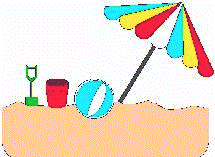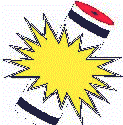Fire Safety
Click for sound!
Fires and burns are the second most common cause of death among children because they can't always escape fire and smoke inhalation. Most home fires happen between 8:00 p.m. and 8:00 a.m., while you're sleeping.
Smoke detectors can stop the risk of dying in 86 percent of fires. The law says all homes must have smoke detectors. If yours is battery-operated, be sure to test it every month. Change the batteries every six months to a year. All smoke detectors should be checked twice a year to be sure they're working right. If you can't afford a smoke detector, contact your local fire department to find out how to get one for little or no cost. There should be at least one smoke detector on every floor.
To keep your children from being burned in a fire, teach them about fire safety, what the smoke detector sounds like, and what to do if they hear it.
Take extra steps to keep fires from starting:
- Teach older kids how to use heaters, irons, or stoves safely so they won't start a fire.
- Keep matches and lighters out of reach of children.
- Safely dispose of used matches, lighters, and cigarette butts.
- Follow directions and safety laws when using space heaters.
-
|
|
- Keep small heaters and stoves where they can't be tipped over and where small children can't reach them. Keep towels, curtains, bedding, and other flammable things away from heaters and stoves.
- Keep a working fire extinguisher handy. Teach children how to use it.
|
|
| Try not to use extension cords. Children may pull or chew on them, which can cause shocks or electrical fires. |
|
- Have your chimney or wood stove checked and cleaned every year.
-
|
|
- Never let your children play with fireworks.
|
Click for sound!
 |
- Fires aren't the only thing that can burn children. Burns from hot water or other hot liquids cause most nonfatal burns to very young children. A child can get a third-degree burn and need to go to the hospital from just three seconds of touching 145° water. Set your hot water heater's temperature at 120° to 125°. You can buy thermometers for testing water temperature. These are available in hardware or home stores. Use them to test bath or dish water to be sure your children don't get burned.
|
- Sunburns can also be very bad for children because their skin is new and very sensitive, whether they are dark- or light-skinned. Dress children in long sleeves and hats. If they are in the sun, be sure to use sunscreen with sun protection factor (SPF)) of at least 15. Most sunscreens for children have SPF of 30 to 45. If the child is under six months-old, check with your health professional before using sunscreen. Always be careful not to get sunscreen in children's eyes.
|
 |
Click for a worksheet!


